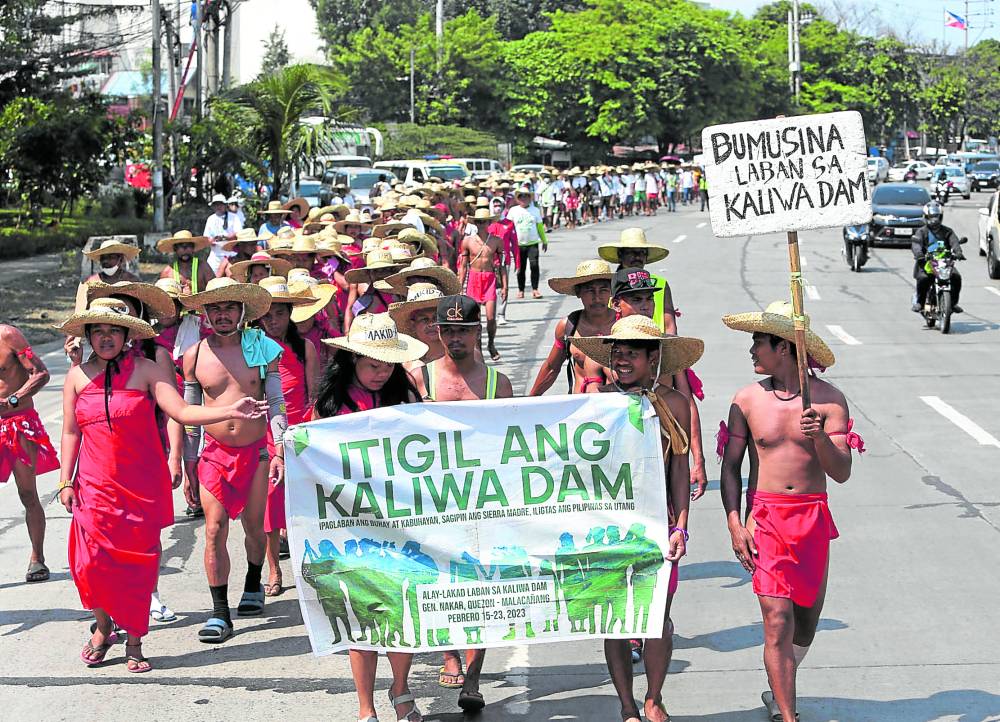Marcos snub dismays marchers vs Kaliwa dam project

GRUELING MARCH About 300 members of the Agta indigenous community from Quezon province march along the Quezon Memorial Circle in Quezon City on Friday on their way to Malacañang to protest against the construction of the Chinese-funded Kaliwa Dam project that will inundate their ancestral homes. —MARIANNE BERMUDEZ
LUCENA CITY—A tribal chieftain from the Sierra Madre mountains in Quezon province was dismayed that President Marcos ignored them following their nine-day protest march to reach Malacañang on Friday to dramatize their opposition to the Chinese-funded Kaliwa Dam.
“After such a long and grueling march, his (Marcos) failure to face us is infuriating,” Agta community leader Ramcy Astoveza said in a phone interview.
He said the march was an indication that there was a growing opposition to the dam project, which would inundate the homes of Agta families in Quezon.
“A lot of people have joined and expressed solidarity with us in the protest march,” Astoveza said.
On Feb. 15, more than 300 members of the indigenous community from the Sierra Madre and representatives of multisectoral organizations supporting them started their 150-kilometer protest march from Quezon’s General Nakar town to Malacañang in Manila.
Mendiola barricade
Rene Cerilla, president of Pambansang Kilusan ng mga Samahang Magsasaka (Pakisama), who was one of the marchers, was also disappointed over the reported snub by the President.
“We marched peacefully, but the President did not even notice the appeal of the indigenous people. Instead, he barricaded Mendiola with lots of antiriot policemen,” Cerilla said.
He described the long trek under the blazing sun and cold rain as “really punishing for the body.”
“We endured hunger, thirst, mosquito bites and pavements as sleeping mats. And yet, not even a short statement from Malacañang was issued, and not even a lowly official was sent to meet us,” Cerilla lamented.
But still, Astoveza and Cerilla considered their antidam protest “a success.”
Cerilla pointed to the “warm support” they received from the public, religious and local officials along the march route.
Astoveza said their opposition to the dam project would continue.
“Our struggle to save Sierra Madre and protect our people will not stop,” he vowed.
Hardship on the road
A heavy downpour drenched the marchers in Real town on their second day on the road, forcing some of them to chopped off broad banana leaves along the route for use as protection against the rain.
When the day’s march ended, some of the participants fell ill.
Expidito Agripa, media coordinator for the Stop Kaliwa Dam (SKD) group, said the marchers treated themselves with herbal medicines that they brought with them and those they had found along the way.
SKD is a network of local and international organizations, institutions and multisectoral groups that oppose the P12.2-billion dam, which is one of the flagship projects under the Duterte administration’s “Build, Build, Build” program.
The construction of the dam, which has been touted to solve the looming water crisis in Metro Manila, was awarded to the Chinese company China Energy under an official development assistance agreement between Manila and Beijing.
But the project could submerge parts of the Sierra Madre in Tanay town, Rizal province, and General Nakar and Infanta towns in Quezon province.
The construction is expected to flood a 9,700-hectare watershed and affect 1,465 families, according to studies by the Save Sierra Madre Network Alliance.
The project will also include the Upper Marikina Watershed and the Kaliwa Watershed Forest Reserve, a conservation site in the Sierra Madre Biodiversity Corridor, which was designated as a protected area by Presidential Proclamation No. 1636.
Tunneling in progress
Early this month, the Metropolitan Waterworks and Sewerage System (MWSS) announced that the dam could be completed by 2026 and start operating the following year.
In December last year, MWSS administrator Leonor Cleofas said the project would be pushing through after securing all the necessary construction permits, including the certificate of precondition from the National Commission on Indigenous Peoples, and the free, prior and informed consent of concerned indigenous communities.
In the same month, the MWSS and the Department of Public Works and Highways began digging a tunnel from Teresa to Morong towns in Rizal province.
The 22-kilometer tunnel is one of the two major phases of the project. The second is the actual dam construction.
According to Cleofas, the construction of the dam may begin once the 46 families directly affected by the project were relocated.
Once operational, the project is expected to provide 600 million liters per day to augment the needs of some 17 million residents in “Mega Manila.”